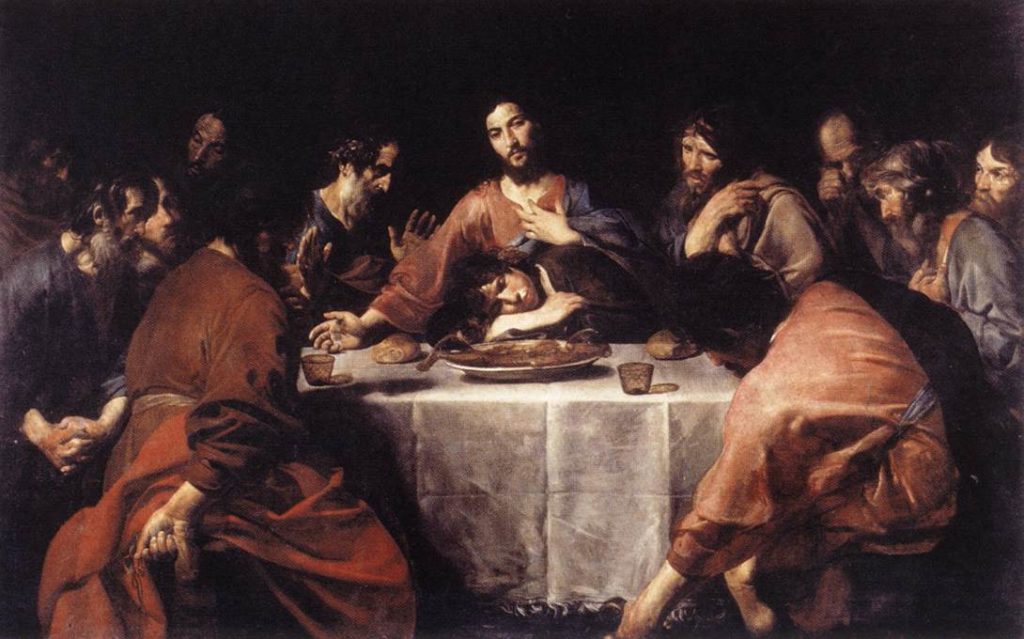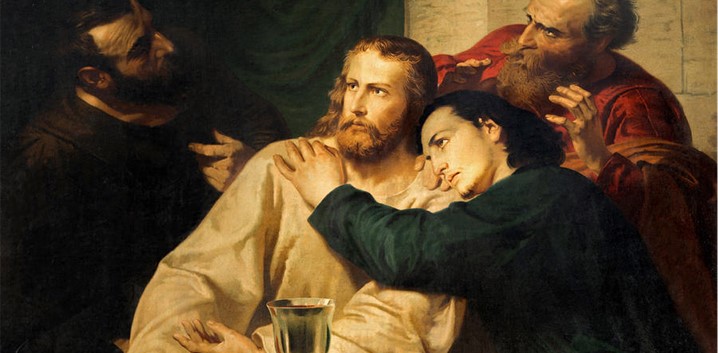Holy Week / Day 4
Betrayal
April 13 // WEDNESDAY OF HOLY WEEK

Readings : Isaiah 50:4-9A; MATTHEW 26:14-25
SCRIPTURE :
“Amen, I say to you, one of you will betray me.” Matthew 26:21
REFLECTION :
When I was young, I remember the intrigue of ‘betrayal’ surrounding this story of Judas. And intrigue there is, as Judas confers with the religious leaders about an asking price. But the reality is that today’s Gospel reading is about betrayal, and there is nothing cool about that. Jesus is betrayed by an intimate, by one whom he chose to be an apostle, by one who had accompanied him through-out his ministry of proclaiming God’s kingdom. He is betrayed by one with whom he had shared bread many times; indeed, in today’s reading, Judas “dipped his hand into the dish with [Jesus].” And, as the story proceeds, Judas will identify Jesus as the one to be arrested by offering a kiss, a gesture that grossly twisted its typical conveyance of peace. The purpose here is not to pile on Judas, but to highlight what a terrible thing betrayal is. Sadly, betrayal is something that many people experience. These can take consolation knowing that they have as Lord one who empathises with them. One who, as the third Servant Song from Isaiah declares, knows how to speak to the weary a word that will encourage them. The betrayal of Jesus was the beginning of many sufferings he bore on his way to the cross. Like the Servant, he was able to endure because he knew God’s help. As we arrive at the high point of our Easter meditations, we will have occasion to see that, while betrayal sets in motion the saving events we will celebrate, it does not have the final word. God’s love and power to save through Jesus have the last say.
MEDITATION :
Jesus has experienced the pain of strained or broken relationships: the betrayal of Judas, the sleepiness of his friends in the garden, their desertion at his arrest and death. Human relationships are messy; Jesus is no stranger to that fact. Offer Jesus a relationship in your life that is in need of healing. Pray this week that the reconciling love of the cross may have the final word.
PRAYER :
Jesus, forgive my betrayals, my sleepiness, and my desertion. Replace my weakness with faithfulness so that even when I sleep, my heart will be awake with you. [Song of Songs 5:2]
REFLECTIONS ADAPTED FROM : Not By Bread Alone by Amy Ekeh, Thomas D. Stegman SJ
IMAGE : By Valentin de Boulogne, The Last Supper. Created between 1625 and 1626.
Holy Week / Day 3
An Endless Moment
April 12 // TUESDAY OF HOLY WEEK

Readings : Isaiah 49:1-6; JOHN 13:21-33, 36-38
SCRIPTURE :
Reclining at table with his disciples, Jesus was deeply troubled . . . John 13:21a
REFLECTION :
Few scenes in Scripture are as intimate as Jesus’ last meal with his disciples. We imagine them in a darkened room, candles flickering, a small space, quiet voices. We wonder what everyone was thinking and feeling. Jesus had been predicting his death, and now he speaks of betrayal and of going away. There was surely an intensity about him that the disciples would have detected. Today’s Gospel tells us that, sitting at the table with his disciples, Jesus was “deeply troubled.” To imagine Jesus troubled is both comforting and disturbing. The evangelists do not shield us from the emotions of Jesus. During his ministry, we see anger, exasperation, and grief. As death draws near, we see dread, distress, and a troubled spirit. Neither life nor death is easy. The moments in the Upper Room were precious ones between Jesus and his friends. True, the moments were filled with misunderstanding, confusion, and even betrayal. And yet the bond of living and traveling together, of listening and learning—of loving one another filled the room, too. I like to think time was suspended for those seemingly endless moments: eating together one last time, praying and singing ancient songs, the quiet murmuring of conversations, the instant hush when Jesus spoke. Have we ever had such an endless moment with Jesus of Nazareth? Have we hushed our own souls to listen? Will we enter into his distress and allow our own emotions to create intimacy between ourselves and Jesus as the cross draws near?
MEDITATION :
Intimacy with Jesus is also signalled in the Gospel reading by the reference to the disciple “whom Jesus loved” resting against his chest. The beloved disciple is never named in John’s Gospel. One reason is that he serves as a model for all of Jesus’ disciples. As John depicts Jesus in the Prologue as being at the Father’s bosom from eternity [1:18], so now he employs the same word, kolpos, to describe the beloved disciple’s resting against Jesus’ chest. Each one of us is invited to that intimacy with the One who tenderly washes our feet and offers himself to us as the Bread of Life.
PRAYER :
Lord Jesus, draw me close to you. Help me to live as your beloved disciple.
REFLECTIONS ADAPTED FROM : Not By Bread Alone by Amy Ekeh, Thomas D. Stegman SJ
IMAGE CREDIT : Jesus and St. John at Last Supper from 19 Century in St. Michaels Church [Michelskerk] photo by Jozef Sedmak.
Holy Week / Day 2
Anointed
April 11 // MONDAY OF HOLY WEEK

Readings : Isaiah 42:1-7; JOHN 12:1-11
SCRIPTURE :
“Let her keep this for the day of my burial.” John 12:7
REFLECTION :
We so easily refer to Jesus as “Christ” that the latter is tantamount to a last name. “Christ” is not a surname, however, but a title. It means “Anointed One,” typically rendered “Messiah.” At the beginning of his ministry, Jesus interprets the outpouring of the Spirit at his baptism as an anointing that will lead him to bring good news to the poor, sight to the blind, and freedom to captives [Luke 4:14-21; cf. Isaiah 61:1-2]. In today’s Gospel, near the end of his life and ministry, Jesus receives another anointing, from Mary of Bethany. Mary’s anointing with costly oil is an extravagant gesture of love for Jesus, who defends her gesture, interpreting it as an anticipatory burial anointing. Messiah he is, but one whose mission includes suffering and death. The first reading, from Isaiah, is the first of four songs of “the Servant of the Lord.” We will hear all four Servant Songs during Holy Week, culminating on Good Friday. From early on in the Church (likely starting with Jesus himself), the Servant described in these songs has been understood to illuminate Jesus’ ministry and, especially, his suffering and death.
Today’s reading evokes much of what Jesus set forth at the outset of his ministry—e.g., opening the eyes of the blind, bringing forth captives from the dungeon. The song also accents the Servant’s nonviolence and gentleness (“Not crying out, not shouting, / . . . A bruised reed he shall not break”). The gentleness of the Servant is not weakness, but rather is an expression of power, the power of love. Something to keep in mind throughout the week as we prayerfully contemplate Jesus, the suffering Messiah.
MEDITATION :
Mary used so much oil to anoint the feet of Jesus that “the house was filled with the fragrance of the oil.” Her extravagance was in proportion to her love. How will we give extravagantly to Jesus? With what act of service will we show our boundless love this Holy Week?
PRAYER :
Jesus, the presence of your friends Mary, Martha, and Lazarus was a comfort to you as you neared the end of your life. May we be a comforting presence to all we encounter, ready to relieve their suffering in any way we can.
REFLECTIONS ADAPTED FROM : Not By Bread Alone by Amy Ekeh, Thomas D. Stegman SJ
IMAGE CREDIT : A Woman Anoints the Feet of Jesus by James Tissot.
Holy Week / Day 1
Enter the Story
April 10 // Palm Sunday

Readings : Luke 19:28-40; Isaiah 50:4-7; Philippians 2:6-11; Luke 22:14-23:56 or 23:1-49
SCRIPTURE :
And now as he was approaching the slope of the Mount of Olives, the whole multitude of his disciples began to praise God aloud with joy for all the mighty deeds they had seen. Luke 19:37
REFLECTION :
I don’t know if you have ever experienced actually using palms on Palm Sunday at church. I can just imagine children having fun with them as they are passed down the row, held in the air, wiggled and waved, gripped in palms of every size, from largest to smallest. Waving palms on Palm Sunday is an old tradition. We do it like we do so many things in liturgy—with our bodies as well as our minds, hearts, and voices. We feel the smoothness of the palm in our hands, we see its sleek lines and its pale green colour, we feel the air move as we wave it, we see how many fill the church, we feel the energy in the room. With this day—with this movement and this liturgy—we move into the dance, the ceremony of Holy Week.
When we reach out and take the palm, we commit ourselves to an ancient story and our part in it. We become the crowd. The Pharisees were scandalised by the shouting and praising and joy of the welcoming crowds, all because of Jesus. They told Jesus to silence his disciples, to make the people stop, as he approached the Mount of Olives. But Jesus didn’t stop the people, and he won’t stop us. We know what is to come. But for today, for now, we take up palms. We pass them down the row. We place one in every hand, largest to smallest. We enter the story.
MEDITATION :
We hear two Gospel readings today: Jesus’ triumphant entry into Jerusalem and the passion story. The people who jubilantly welcome Jesus’ yell, a few days later. “Crucify him!” Their fickleness contrasts with Jesus’ faithfulness. He enters the city riding on a beast of burden, not on a warhorse. In death, he embodies what he has taught: loving and forgiving his enemies; reaching out in mercy to the marginalised (i.e., the repentant criminal); praying with trust to his Father.
PRAYER :
Lord Jesus, as I hold my palm, help me to recall your faithfulness-and-love-unto-death.
REFLECTIONS ADAPTED FROM : Not By Bread Alone by Amy Ekeh, Thomas D. Stegman SJ

